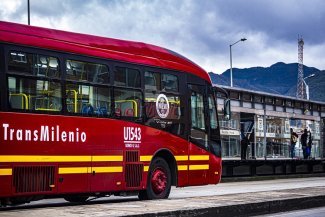Samuel Johnson, secretary-general of the National Teachers Union of Liberia, tells Equal Times: “They say that they are trying to weed out ghost teachers, but who are the ones who hired those ghosts?”
When Mary Mulbah was fired from her job as a second grade teacher last October along with 14 of her colleagues, she knew she was being punished for speaking out against the Liberian government. Just weeks earlier, Mulbah, 55, had been a vocal supporter of a national “go-slow” action by teachers, who were protesting the country’s controversial plan to outsource nearly 100 public schools to foreign education companies and charity providers.
Mulbah is the acting president of the National Teacher’s Association of Liberia (NTAL), and she says all 14 of the teachers who were fired in the weeks after the action were members of the union leadership in Margibi County, about an hour’s drive from the capital city of Monrovia.
After the action, widely covered as a ‘strike’ in the Liberian press, Mulbah attended a mediation session hosted by the National Christian Council of Liberia where union representatives met with officials from the Ministry of Education about their concerns over the outsourcing plan, dubbed the ‘Partnership Schools for Liberia’ (PSL).
“One told me that they wanted to dissolve the teachers’ union,” she says. “That’s why they sacked all the leaders.”
When the PSL was announced by Liberia Education Minister George Werner in spring 2016, assurances were made that the government would maintain control of the schools and that teachers would be allowed to remain unionised.
Later, writing in Quartz Africa in January 2017, Werner challenged characterisations of the plan as privatisation, saying, “teachers are civil servants on government payroll, and have every right to be members of teacher associations – Liberian teacher unions.”
But union leaders say that the government’s actions have contradicted this promise, with teachers who spoke out against the PSL being abruptly fired in recent months.
And three teachers who were interviewed for this report who work at a school run by Bridge International Academies – a US-based for-profit provider who operates the largest number of schools under the pilot – say they were instructed not to speak to journalists or union leaders.
“Ghost teachers” and corruption – who is to blame?
Proponents of the PSL describe the plan as a bold step towards addressing poor learning outcomes amongst students in the country. Critics have countered that handing the reigns of public education in Liberia over to foreign companies and charities will have lasting consequences for the state’s ability to teach its own citizens.
While all observers agree that reforms are needed, the PSL has been controversial, and in March 2016 the UN Special Rapporteur for Education, Kishore Singh, called for an independent body to monitor “violations of the right to education that might result from this development.”
But teachers’ union representatives say that their role providing oversight has been challenged by a quiet campaign being waged against them, and that the PSL has pointed the finger at teachers for shortcomings in the education sector rather than high-level ministry officials.
“They always shift the blame even though they underfund education,” says Samuel Johnson, secretary-general of the NTAL.
Johnson says that when the PSL was announced, union officials received word that the Ministry of Education planned to eliminate more than 6,000 ‘non-existent’ teachers from the payroll in order to help raise money to pay for the programme. Descriptions of ‘ghosts’ on the payroll erroneously conjured images of lazy teachers collecting paychecks while refusing to work, rather than a far more insidious practice – fake names placed into the system by corrupt administrators who divvy up the ill-allocated wages amongst themselves.
“They say that they are trying to weed out ghost teachers, but who are the ones who hired those ghosts?” asks Johnson.
Union officials say that they’ve repeatedly asked the Ministry of Education to incorporate them into the process of finding and eliminating ghosts from the payroll, which serves the interests of teachers by freeing up money for education. But despite prior instances in which NTAL officials have obtained payroll documents and used them to cross-check names with existing members of the union, they say Ministry officials refuse to incorporate them into the clean-up process.
“We have told them many times that the payroll will be cleaned if they work with us. I was the principal; I know how many teachers work under me. If anybody is listed in the classroom that I don’t know, it’s a ghost,” says Tubman Snawolo, an NTAL official who was amongst the fifteen fired after last October’s action.
Teachers told to stay quiet – or else
Amongst the concerns raised by critics of the PSL in its early stages was that the monitoring role played by the teacher’s union could be degraded or eliminated altogether. In Kenya, for example, Bridge International Academies instructors say they are discouraged from being members of the local union.
Werner’s assurance that PSL teachers would remain on the government payroll was in part an effort to address this fear.
But teachers at one school run by Bridge say that despite paying union dues, they’ve been threatened with the loss of their jobs if they speak to union officials or journalists.
The teachers, speaking on the condition of anonymity, say that when they complained to the union over their low salaries, Bridge officials said there would be consequences if they did so again in the future.
“They said they would give us a warning letter for bringing our complaint to NTAL,” one teacher said. “They threatened us that we shouldn’t do it again.”
Another teacher said that staff at the school were further instructed not to speak to journalists. “They say we are trying to undermine their programme by engaging the media, that we wouldn’t say something good about them because we aren’t being treated fairly.”
All three of the teachers interviewed for this piece say that Bridge had brought free uniforms for students and had provided them with valuable training, but expressed frustration at the lack of a feeding programme and low salaries relative to their increased workload.
“I signed a one year contract, and I just want to bear it,” said one. “When the year is finished I’ll take a new assignment elsewhere, not in a Bridge school.”
Education advocates in Liberia say that efforts to prevent teachers in PSL schools from freely communicating with their union representatives will have a chilling effect on their ability to raise concerns over the programme – a worrying development, given the government’s plans to expand the pilot to another 100 schools in the 2017 school year before publishing results of the year-one evaluation.
According to Anderson Miamen, director of the Liberian affiliate of Transparency International, Bridge’s instructions to its staff not to speak with union leaders runs contrary to Liberia’s political culture.
“Liberia is a democratic country in which citizens and workers are at liberty to move and speak out freely, so why would someone be suppressing their views?” asks Miamen. “What is it that [Bridge’s] management wants to hide by keeping teachers from speaking out?”










